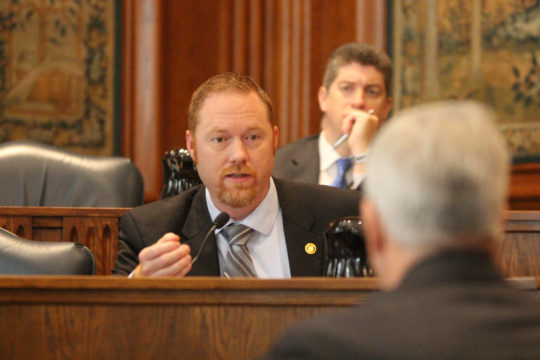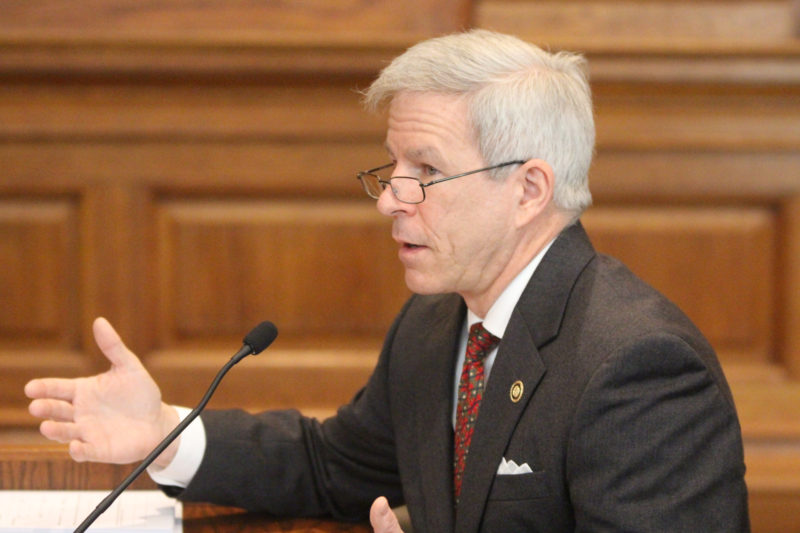JEFFERSON CITY, Mo. – Sen. Rob Schaaf got his wish Tuesday morning when the Senate Rules, Joint Rules, Resolutions and Ethics Committee met to hear testimony on a bill that would force the disclosure of contributions to political nonprofits.
The senator says the bill is necessary for healthy political discourse.
“Without disclosure, voters lack the info that they need to have when they make decisions about about how to vote,” he said. “They have no way to monitor if politicians are making political favors for help from political spenders. This increases the risk of corruption and the appearance of corruption and in a case like that, it causes voters to suspect there is corruption occurring.”
Schaaf’s recent fight against these kind of “dark money’ contributions have made headlines across the state as he has become a thorn in the side of Senate leadership and Gov. Eric Greitens for his filibusters and stalls on the Senate floor. He opposed the expansion of Missouri’s managed care system, but the situation quickly escalated.
A political nonprofit designed solely to push Greitens’ agenda, A New Missouri Inc., exacerbated the tension when they created attack ads on social media which initially contained Schaaf’s private cell phone number, urging people who supported the governor to call Schaaf and request he stand down on his stances for managed care.

Since those ads came out and largely backfired, Schaaf found renewed vigor and support in the Senate and promised to stall debate on any bill that was not a budget bill or a bill that would force dark money groups to disclose their donors.
The Senate passed the budget last week.
While Democrats and some Republicans have supported the measure, Senate leadership has resisted moving such legislation forward. Schaaf’s bill was prefiled Dec. 2, 2016 and assigned to that committee Jan. 10.
The Senate’s top leader attended the hearing. Senate Majority Floor Leader Mike Kehoe, who usually presides over the committee, could not attend given flooding around his home, so Senate President Pro Tem Ron Richard oversaw the hearing. Richard said at the outset of the hearing that there was the necessary “good cause” to bring the legislation forward to a hearing with less than 24 hours notice as only eight legislative days remain on the calendar. The hearing posting happened Monday evening.
Sens. Jason Holsman and Bob Dixon each noted they would like to add amendments to the bill that would help ensure non-political nonprofits and longstanding political organizations, like the NRA or the NAACP, would not apply to the bill. However, Sen. Bill Eigel noted he had concerns with the legislation, which he called a “careful dance between transparency and privacy.”
“Although intended to provide more transparency, what we may find is we’re delving into the privacy of citizens that are donating to these organizations and they don’t want their name associated with these organizations because they feel there could be some sort of retribution,” Eigel said.
Sen. Bob Dixon tried to “lighten the mood” later after Hegeman echoed some of the same concerns to Schaaf.
“You know a little something about retribution lately, don’t you?” Dixon said to Schaaf with laughs and giggles from most of room.
Richard did not laugh.
Those who testified in opposition to the bill, Jeremy Cady of the Missouri arm of Americans for Prosperity and James Harris of the Adam Smith Foundation, echoed that concern. Harris said the bill could have a “chilling effect on free speech” that would force “people to publicly display what their beliefs are.”
Holsman argued nonprofits like A New Missouri, which propagated ads accusing Schaaf of standing against ethics reform despite prefiling some of the Senate’s earliest ethics bills this session, could make false accusations with no retribution against people who paid for those ads. Holsman added that in the legal world, people have a right to face their accusers.
“In the political world, you never get to find out who is paying for accusations,” Holsman said.
The bill did not have an executive session, and no one testified in favor of the bill.







